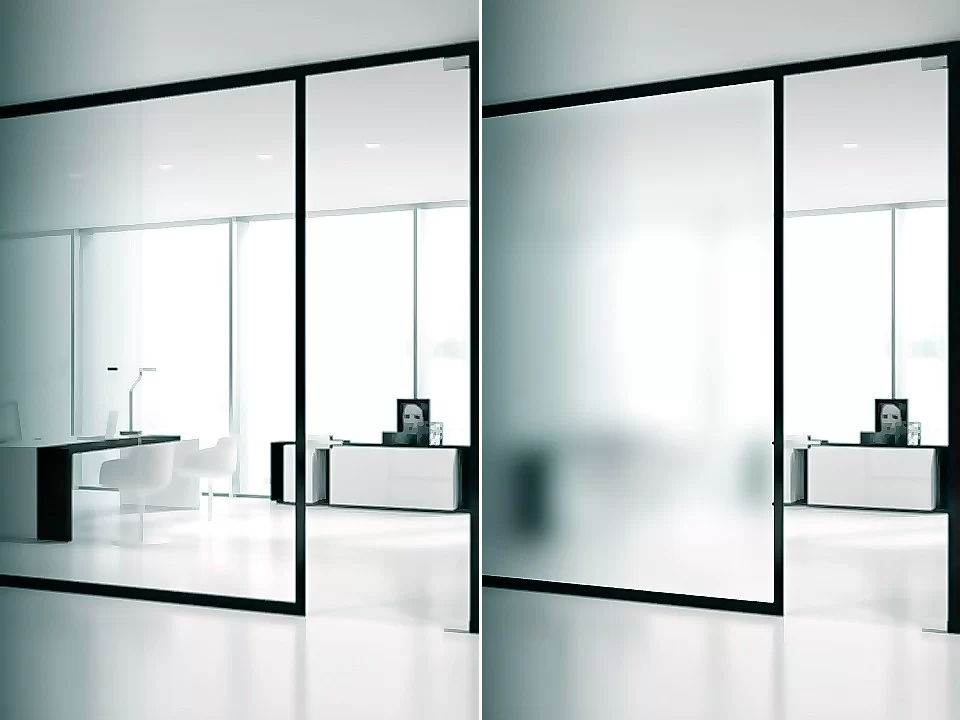SMART GLASS
Smart film for glass is an innovative technology that has been gaining popularity in recent years. This film can be applied to glass surfaces and can be controlled to change the transparency of the glass, allowing for greater control of light, privacy, and energy efficiency.
Smart film for glass works by using a layer of liquid crystal polymer, which can change its alignment in response to an electric current. When the film is applied to glass, it can be controlled using a remote control, a phone app, or a building management system, to adjust the transparency of the glass. This means that the film can be used to create privacy, reduce glare, or control the amount of sunlight that enters a building.


One of the main benefits of smart film for glass is its ability to improve energy efficiency. By controlling the amount of sunlight that enters a building, smart film can reduce the amount of heat that is generated inside the building, which can lower cooling costs and reduce energy consumption. In addition, smart film can also reduce the amount of carbon dioxide emissions that are produced by a building, which can help to reduce the building’s carbon footprint.
Another benefit of smart film for glass is its ability to create privacy in a variety of settings. The film can be applied to glass walls or doors to create a private space for meetings or conferences. When the film is turned on, it makes the glass opaque and prevents viewing from the outside. This can be especially useful for companies that work with sensitive data or confidential information.
Electrochromic glass can be used in a variety of settings, including offices, hotels, hospitals, shops, and even homes. In office spaces, it can be used to create confidential zones and control lighting within the building. In hotels and hospitals, it can be used to provide privacy for patients and guests. In shops, it can be used to create interesting design solutions and attract the attention of shoppers. In homes, it can be used to create private spaces, such as in the bathroom.


However, smart film for glass does have some limitations. It can be quite expensive, so not all companies or individuals may be able to afford it. In addition, it may have a limited lifespan, so it is important to carefully review warranty terms before purchasing.
Overall, smart glass is an exciting technology that has the potential to transform the way we interact with glass surfaces. As the technology continues to evolve and become more accessible, we can expect to see it increasingly used in a variety of settings.
One area where smart film for glass has already shown great promise is in the automotive industry. The film can be applied to car windows to regulate the amount of light that enters the car, reducing glare and improving visibility. This can lead to safer driving conditions and a more comfortable ride for passengers. In addition, smart film can also provide privacy for occupants of the car, making it an attractive feature for luxury cars and limousines.
Another area where smart film for glass is being used is in the field of architecture. The film can be applied to large glass facades on buildings, allowing for greater control over the amount of light that enters the building. This can help to reduce the energy consumption of the building and make it more environmentally friendly. In addition, smart film can also be used to create interesting design solutions, such as dynamic facades that change appearance throughout the day.


Smart film for glass is also being used in the field of interior design. The film can be applied to glass partitions, creating private spaces within a larger room. This can be useful in open-plan offices or in homes where there is a need for flexible living spaces. In addition, smart film can also be used to create decorative elements, such as glass dividers with custom designs.
As the use of smart film for glass continues to grow, it is important to consider the potential implications for privacy. It is important to use the technology responsibly and consider the privacy implications of its use.
In conclusion, smart film for glass is an exciting technology that has the potential to revolutionize the way we use with glass surfaces. It allows for greater control over transparency and can be used to regulate light, improve energy efficiency, and create private spaces. However, it is important to carefully consider the capabilities and limitations of the technology and use it responsibly.
OUR CONTACTS
- (347)860-7999
- sales@glass-desire.com
- 1951 68th street, Brooklyn NY 11204
- 9:00AM - 6:00PM | Monday - Friday
